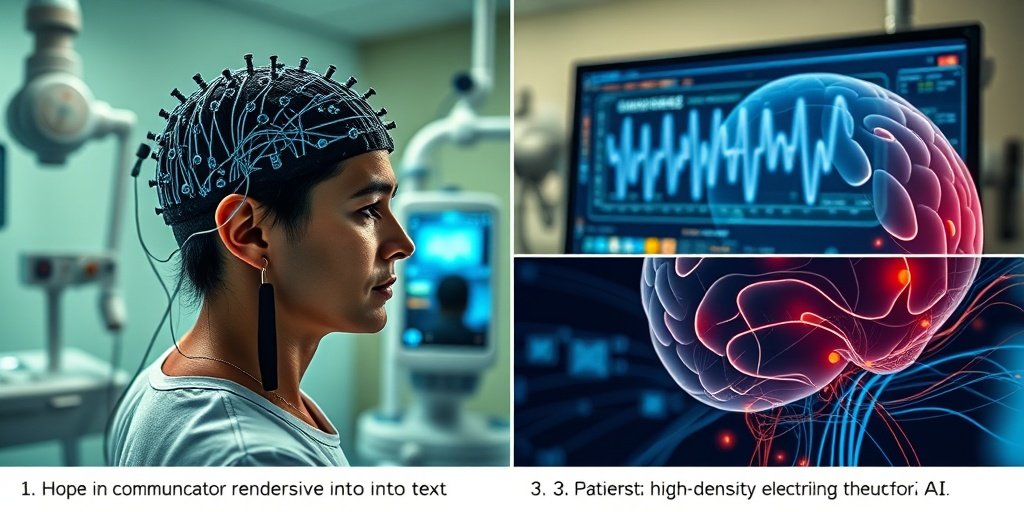⚡ Quick Summary
This comprehensive review on inner speech decoding explores the potential of identifying silently generated speech from neural signals, offering hope for individuals with severe communication impairments. The study highlights the integration of advanced machine learning techniques, achieving promising results in controlled environments.
🔍 Key Details
- 📊 Technologies Reviewed: EEG, electrocorticography, machine learning algorithms
- 🧩 Techniques Used: Linear discriminant analysis, deep convolutional networks, hybrid EEG-fMRI fusion
- 🏆 Accuracy: Reasonable accuracy with small vocabularies under controlled conditions
- 🔍 Focus: Public datasets of imagined or articulated speech
🔑 Key Takeaways
- 🧠 Inner speech decoding can significantly aid communication for those with physical or neurological disabilities.
- 💻 Machine learning plays a crucial role in interpreting neural signals for covert speech.
- 📈 Context-based approaches can enhance decoding accuracy.
- 🔒 Ethical considerations include brain data privacy and informed consent.
- ⚙️ Methodological standards are essential for effective inner speech recognition.
- 🌐 Interdisciplinary issues must be addressed for responsible technology development.
- 📅 Publication: Wiley Interdisciplinary Reviews: Cognitive Science, 2025.

📚 Background
The field of inner speech decoding has gained traction as a promising technology for individuals with severe communication challenges. By interpreting neural signals associated with silent speech, researchers aim to provide alternative means of verbal expression for those unable to communicate effectively due to physical or neurological disabilities. This review synthesizes recent advancements and methodologies in the field, emphasizing the importance of ethical considerations and methodological rigor.
🗒️ Study
The review encompasses various recording modalities, from noninvasive EEG to high-density electrocorticography, and discusses the integration of machine learning strategies to decode inner speech. The authors analyze the effectiveness of different algorithms, including linear discriminant analysis and deep convolutional networks, while also considering the impact of sensor quality and training data size on decoding outcomes.
📈 Results
The findings suggest that small vocabularies can yield relatively reasonable accuracy in controlled settings. The review highlights the significance of context-based approaches in refining decoding outcomes, illustrating how various factors such as sensor quality and domain adaptation influence performance. The authors emphasize that high-quality preprocessing and informed modeling choices are critical for achieving effective inner speech recognition.
🌍 Impact and Implications
The implications of this research are profound, particularly for individuals with communication impairments. By advancing inner speech decoding technologies, we can enhance the quality of life for those who struggle to express themselves verbally. However, the review also underscores the necessity of addressing ethical, societal, and regulatory challenges, including brain data privacy and user trust, to ensure responsible development and adoption of these technologies.
🔮 Conclusion
This comprehensive review highlights the exciting potential of inner speech decoding as a transformative technology for communication. By leveraging advanced machine learning techniques and addressing ethical considerations, we can pave the way for innovative solutions that empower individuals with severe communication challenges. The future of this field looks promising, and continued research is essential for unlocking its full potential.
💬 Your comments
What are your thoughts on the advancements in inner speech decoding? We invite you to share your insights and engage in a discussion! 💬 Leave your comments below or connect with us on social media:
Inner Speech Decoding: A Comprehensive Review.
Abstract
Inner speech decoding is the process of identifying silently generated speech from neural signals. In recent years, this candidate technology has gained momentum as a possible way to support communication in severely impaired populations. Specifically, this approach promises hope for people with a variety of physical or neurological disabilities who need alternative means of verbal expression. This review covers recording modalities that range from the noninvasive EEG to the high-density electrocorticography and discusses how linear discriminant analysis, deep convolutional networks, and hybrid fusion of EEG with fMRI are integrated into machine learning strategies to infer covert speech. This review synthesizes evidence to suggest that small vocabularies, under controlled conditions, can yield relatively reasonable accuracy while further refining the decoding outcome via context-based approaches. The impact of sensor quality, training data size, and domain adaptation is illustrated by focusing on public datasets of imagined or articulated speech. Throughout the article, the methodological standards emerging across laboratories will be discussed, emphasizing that effective inner speech recognition involves high-quality preprocessing, subject calibration, and informed modeling choices balanced against computational power for interpretability. In addition to technical advancements, this review also examines the ethical, societal, and regulatory challenges surrounding inner speech decoding, including brain data privacy, neural rights, informed consent, and user trust. Addressing these interdisciplinary issues is critical for the responsible development and real-world adoption of such technologies. This article is categorized under: Neuroscience > Computation Computer Science and Robotics > Machine Learning.
Author: [‘Almufareh MF’, ‘Kausar S’, ‘Humayun M’, ‘Tehsin S’, ‘Farooq A’]
Journal: Wiley Interdiscip Rev Cogn Sci
Citation: Almufareh MF, et al. Inner Speech Decoding: A Comprehensive Review. Inner Speech Decoding: A Comprehensive Review. 2025; 16:e70016. doi: 10.1002/wcs.70016